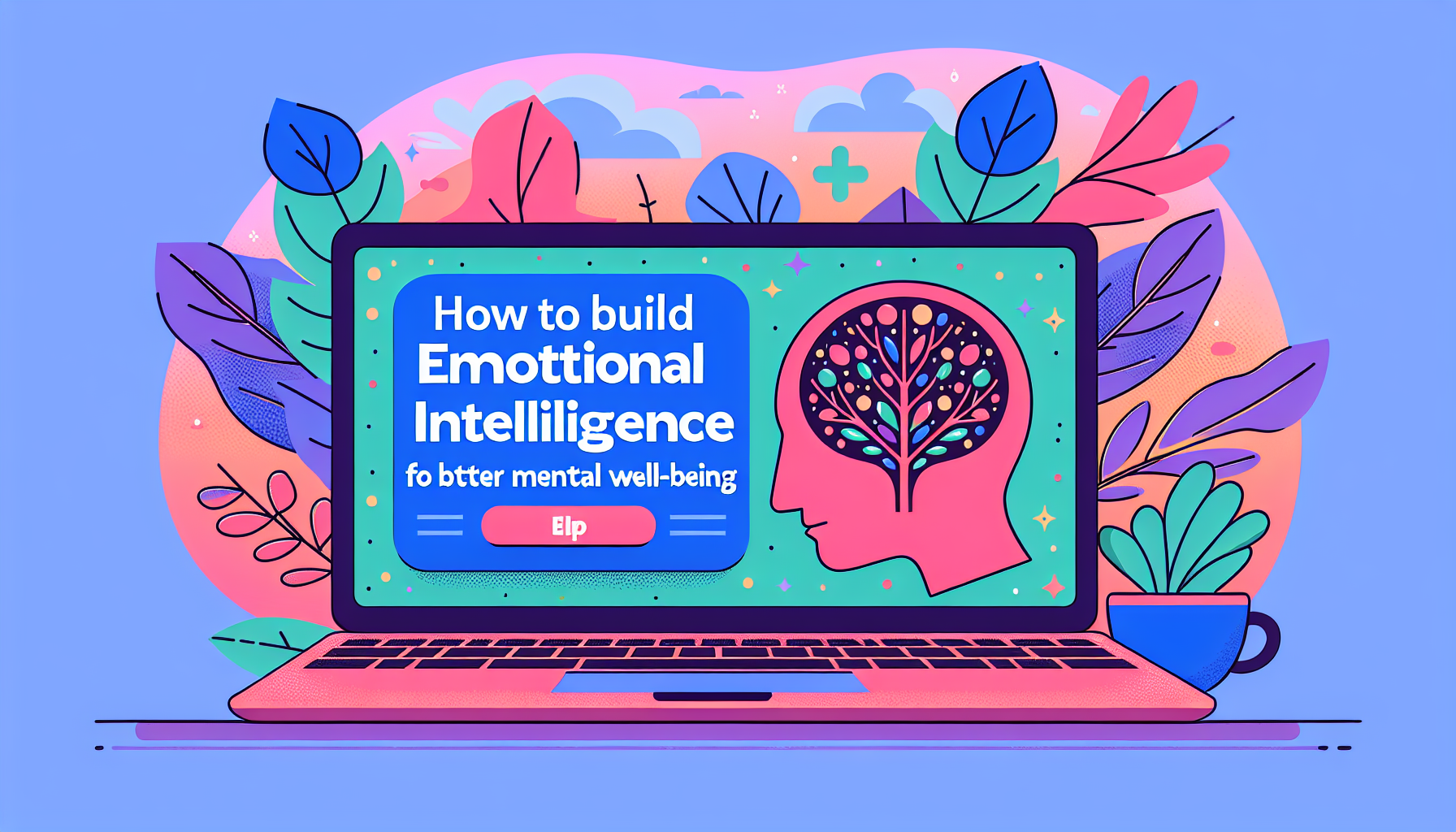Emotional intelligence (EI) has become a buzzword in recent years, particularly in the realms of mental health and personal development. Defined as the ability to recognize, understand, and manage our own emotions as well as the emotions of others, EI plays a crucial role in our overall well-being. In this blog, we will explore how to build emotional intelligence to enhance mental well-being and improve our quality of life.

Understanding Emotional Intelligence
Emotional intelligence comprises five key components:
1. Self-awareness: Recognizing your own emotions and how they affect your thoughts and behavior.
2. Self-regulation: The ability to manage your emotions and impulses.
3. Motivation: Harnessing emotions to pursue goals with energy and persistence.
4. Empathy: Understanding the emotional makeup of other people and being able to treat them according to their emotional reactions.
5. Social skills: Proficiency in managing relationships and building networks.
By developing these components, individuals can better navigate social complexities, make informed decisions, and improve their mental health.
The Importance of Emotional Intelligence for Mental Well-Being
Emotional intelligence has a profound impact on mental well-being. Individuals with high EI are generally more resilient, enjoy better relationships, and experience lower levels of stress and anxiety. Here are some specific ways EI contributes to mental health:
– Better Stress Management: Understanding and managing emotions can help mitigate stress levels.
– Enhanced Relationships: Strong social connections are vital for mental health, and EI fosters better communication and empathy.
– Improved Decision-Making: High EI leads to more thoughtful and reflective decision-making, reducing the likelihood of regret or guilt.
– Increased Resilience: Being emotionally intelligent helps individuals bounce back from setbacks more effectively.
Steps to Build Emotional Intelligence
1. Cultivate Self-Awareness
Self-awareness is the first step in building emotional intelligence. Here are some techniques to enhance your self-awareness:
– Keep a Journal: Write about your thoughts and feelings daily. This practice can help you identify emotional triggers and patterns over time.
– Mindfulness and Meditation: Engage in mindfulness practices to become more attuned to your emotions. Meditation can help you observe your thoughts without judgment.
– Seek Feedback: Ask trusted friends or family members for their perspectives on your emotional responses. This external input can provide valuable insights.
2. Practice Self-Regulation
Once you have a better understanding of your emotions, the next step is to learn how to manage them effectively.
– Pause Before Reacting: When you feel a strong emotion, take a moment to pause and breathe before responding. This can prevent impulsive reactions that you might regret later.
– Develop Coping Strategies: Identify healthy coping mechanisms, such as exercise, deep breathing, or talking to a friend, to manage your emotions during challenging times.
– Set Boundaries: Learn to say no and set limits to protect your emotional well-being.
3. Foster Motivation
Building emotional intelligence also involves harnessing your emotions to pursue goals and maintain a positive outlook.
– Set Personal Goals: Identify what you truly want to achieve and break these goals down into actionable steps.
– Stay Positive: Focus on the positives in your life and practice gratitude to cultivate a sense of motivation and fulfillment.
– Visualize Success: Use visualization techniques to imagine achieving your goals, which can boost your motivation and emotional resilience.
4. Develop Empathy
Empathy is a key component of emotional intelligence that allows you to connect with others.
– Active Listening: Practice listening to others without interrupting. Show genuine interest in their feelings and perspectives.
– Put Yourself in Others’ Shoes: Make an effort to understand the emotions and experiences of those around you. This can deepen your relationships and enhance your emotional connections.
– Volunteer or Help Others: Engaging in community service can enhance your empathy and provide a sense of fulfillment.
5. Improve Social Skills
Strong social skills are essential for building and maintaining relationships, which are crucial for mental well-being.
– Practice Effective Communication: Work on expressing your thoughts and feelings clearly and respectfully. This can include both verbal and non-verbal communication.
– Network: Expand your social circle by joining clubs, groups, or organizations that align with your interests. This can help you practice your social skills and build connections.
– Resolve Conflicts Constructively: Learn to address conflicts calmly and respectfully, focusing on finding solutions rather than assigning blame.
Conclusion
Building emotional intelligence is a lifelong journey that can significantly enhance your mental well-being. By cultivating self-awareness, practicing self-regulation, fostering motivation, developing empathy, and improving social skills, you can create a more balanced and fulfilling life. Remember, emotional intelligence is not a fixed trait but a set of skills that can be developed over time. Embrace the journey, and you will likely find not only better mental health but also richer, more meaningful relationships along the way.
Investing in your emotional intelligence is one of the best gifts you can give yourself, leading to a happier, healthier life. Start today, and watch how your emotional landscape transforms for the better.
AI-Assisted Content Disclaimer
This article was created with AI assistance and reviewed by a human for accuracy and clarity.





Leave a Reply